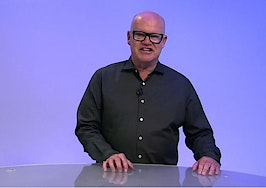With no end in sight to the coronavirus pandemic, it’s a new, constantly changing world for real estate agents. But agents are learning to roll with the punches and finding ways to future-proof their business, according to panelists at Connect Now Thursday.
In a regional breakout discussion about the situation in California and the Pacific Northwest, panelists said buyer activity was strong and single-family inventory was low, but it was hard to know where things were going next.
Frank Nolan of Vanguard Properties in the San Francisco Bay Area believes the San Francisco market is in for a correction (condos in particular are piling up), but expects that it will quickly turn, while the region’s East Bay market will continue to see rising home prices.
Sarita Dua of Keller Williams Professionals in Portland, Oregon, said it’s hard to tell whether there will be a market correction, given the low interest rates, population growth, the economy and the upcoming election.
But she and Nolan are seeing increased interest in vacation homes in their areas.

Sarita Dua
“These COVID times, they don’t necessarily create new trends; they tend to accelerate the trends that were already in place,” she said. Buyers now want something they can easily drive to or that’s income-generating, she said.
Nolan agreed. “People are rethinking the big picture. Everybody that’s fleeing is staying close, staying within 100 miles of San Francisco. My impression is that they’ll come back,” he said.
As the uncertainty of the pandemic continues, agents are becoming adept at the touchless, contactless listing appointment and being willing to embrace technology before it’s perfect, according to Dua. She said she used to only do Matterport 3D tours for homes above a certain price point, but now every home gets that treatment.
Chris Pelkola Lee of simpLEE Home in Idaho noted that there was more demand for Matterport tours from sellers. “It does keep out the lookie-loos, people who don’t like the floor plan,” she said. Sellers are very aware of people walking through their homes and agents are responding with better photos, better videos and better virtual tours, she added.
Still, being human is more important than ever, according to Dua and Nolan.
“We can be high-tech as much as we want, [but] we still need to be high-touch, picking up the phone,” Dua said. Agents have to listen to what sellers want and pull out all the stops to get them that, she added. “We can’t just text and Zoom and DocuSign our way through things. [We] have to pick up the phone and listen. Creativity in communication has been the name of the game for me.”
Dua encouraged attendees to check in with their clients and ask them how they’re doing.
“Everybody is stressed out right now. [A] quick phone call, a quick text, ‘How are you? How’s it going?’ You can’t go too long without checking in,” she said.
She warned that “sometimes people will go off on you” but agents should understand that it’s the process that’s taking a toll and it’s “not necessarily personal.”
Nolan noted that in the Bay Area, there have been layoffs among both buyers and sellers, which is “gut-wrenching.”
“We’re all living in a world of uncertainty and fear and nervousness. Our job, my job, is to not be nervous. To feel confident. And not convey to the sellers what they want to hear,” he said. It’s important to be honest with sellers and tell them information they need to know, but may be unpleasant, he added. “Don’t sugarcoat.”
Dua said her office has taken safety seriously and put procedures in place to minimize risk. For instance, before the pandemic, agents would show homes to anyone, but now she requires a pre-approval letter from buyers. “It’s not fair to us, it’s not fair to them” to do otherwise, she said. Peloka Lee said she also requires buyers to be pre-qualified.
Dua has also found that vacant homes get more showings than occupied ones, so she is encouraging sellers to take off for a few days while their property is being shown.
“Let’s make sure that people can see it and not have that worry that someone is there,” she said.
“We just can’t lay down and put the covers over our head and be like ‘Wake me up when we go back.’ These are things we need to be thinking about long-term and the plans that we have in place,” she added.
Desrie van Putten of Guaranteed Real Estate in California’s Central Valley said her 400-agent brokerage is requiring that all activities at a property, such as showings and cleanings, be logged. The firm is also requiring that listing agents have personal protective equipment (PPE) available at every listing and that buyer’s agents come prepared with PPE. The brokerage has a stash of supplies for emergencies.

Marc Dickow
Marc Dickow, president of the San Francisco Association of Realtors, said the pandemic has been a “true test of messaging” to SFAR’s members.
“We’ve just had to pivot quickly, sometimes day by day as shelter-in-place orders changed, restrictions were lifted and then not lifted,” he said.
The association has been holding webinars two or three times a week with record attendance. Even when the association begins to hold in-person meetings again, he anticipates they will still live-stream them or offer them as webinars because of the increased attendance.
Regarding future-proofing agents’ business, Pelkola Lee had this to say: “Use what you’re already paying for.” Companies are constantly selling to agents, but there are many tools that agents are already paying for through their brokerages, associations and multiple listing services that they are not using. Agents should be looking at their expenses right now, Pelkola Lee advised.
“Don’t go buy the next [tool]. Your MLS may already be paying for one. There’s probably still tools that you’re not fully using. How many of us fully use our CRM? If we use what we’re already paying for already it would help us in a lot of different facets for our business,” she said.
For instance, she’s gone back and looked at transaction management systems that her state association offers, which she was pleasantly surprised to see have improved in the past two or three years. And she’s moved to a new CRM and actually follows what it tells her to do.
Dickow agreed. “I guarantee you 90-some percent of agents are not using even 10 percent of what is being offered to them,” he said.
The session ended on a jovial note as moderator Sabrina Brown of Brown & Brown Real Estate asked panelists to sing what CRMs they used.
“I use Kuunverrrsion,” she sang. Pelkola Lee followed up with “Cloze, Close, Cloze, Close” and Dickow’s voice rose up with “I use Follow Up Boss. It’s really greeaaat.”
As panelists recovered from their laughter, Dickow told attendees not to be afraid to shoot their own video, perhaps of something funny. “Don’t be afraid to show some of your personality. People need it,” he said.
Email Andrea V. Brambila.
Like me on Facebook | Follow me on Twitter





